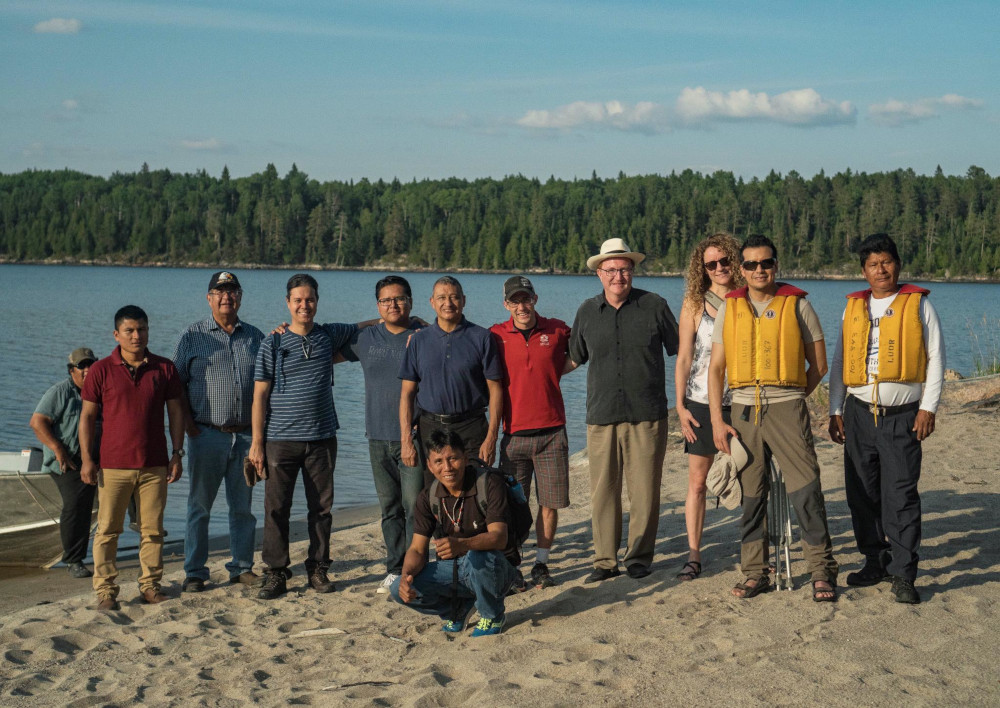Research in Action: Lac Seul/Ecuador Exchange Offers New Insights Into Tourism Potential

Photo Cutline: In Lac Seul, from left, Jairo Calapucha, Tom Chisel, Frederico Oliveira, Jeremy Capay, Fernando Romero, Gavin Shields, Brian McLaren, Rhonda Koster, Patricio Lozano, and José Calapucha. Sitting in front of the group is Paul Shiguango.
Published in the Chronicle Journal Monday, April 1, 2019.
In 2018 Lakehead University researchers and students had a unique opportunity to facilitate and take part in an exchange between two Indigenous communities: Lac Seul First Nation in Ontario and Verde Sumaco in Ecuador. The goal of this project, funded by the Social Sciences and Humanities Council, was to compare experiences of nature- and culture-based tourism in the two communities’ traditional territories. Both communities are looking to land-based tourism as an economic opportunity that may also serve cultural and ecological preservation goals.
The team from Lakehead University included Drs. Frederico Oliveira (Associate Professor, Anthropology) and Brian McLaren (Associate Professor, Natural Resources Management) as leaders of the project, Drs. Rhonda Koster (Associate Professor, Outdoor Recreation, Parks and Tourism), Rosemary Coombe (Canada Research Chair, Anthropology, York University), and Martha Dowsley (Associate Professor, Anthropology/Geography), Lakehead students Caleb Kutcha, Benjamin Bohemier, and Gavin Shields, and Lac Seul Elders Tom Chisel and Kaaren Dannenmann.
The exchange involved two trips: During the study break in February of 2018, the Lakehead team went to Ecuador. Then in July of 2018, a team of researchers from partner university Escuela Superior Politécnica de Chimborazo (ESPOCH), including professors Fernando Romero and Patricio Lozano, and three Verde Sumaco community members, Jairo Calapucha, José Calapucha, and Raúl Shiguango, visited Lac Seul for one week.
Gavin Shields, a fourth year student in Indigenous Learning and Philosophy, emphasized the value of being part of the project. “It was completely different getting an experience in the field with an Indigenous community compared to being in the academic environment, because of what you learn from human interactions and building relationships, but then back in the classroom, you can connect what you learned in the field,” he said.
While visiting each other’s communities, the teams from Canada and Ecuador engaged in a series of discussions and workshops to develop mapping skills, varied concepts of land stewardship and tourism products and itineraries. Over the course of the visits, the groups travelled on foot and by boat through the traditional territories, telling their stories of the places they visited. They discussed which of these stories might be shared with visitors as part of cultural tourism, and which are sacred and should be kept private within the community.
“What really caught our attention and became clearer was how strongly connected to the land the communities were, in similar ways despite different cultures and languages,” said Dr. Oliveira. “The communities understood each other very quickly despite a language barrier. They both see tourism as a way to provide some income for their communities while maintaining a sense of identity,” he said.
Lac Seul Elder Tom Chisel reflected on parallels between the two cultures as well. “We each share similar values and beliefs about taking care of the land for future generations and being able to continue to use the land in a good way,” he said.
Jairo Calapucha, a member of Verde Sumaco, noted the importance of traditional knowledge in establishing tourism initiatives.
“Indigenous peoples such as the Kichwas of the Amazon in Ecuador and Anishinaabe in Canada have an invaluable legacy, which, through the use of their ancestral knowledge and scientific technical knowledge, promote respect and recognition of their rights to strengthen conservation strategies and sustainable tourism based on natural and cultural heritage in their territories,” he said.
Both communities felt that the exchange was valuable and hope to keep the relationship going. A report featuring pictures of the exchange will be published soon, and the team is also using footage taken in both Verde Sumaco and Lac Seul to put together a documentary film.


